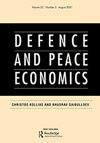Political Accountability and Military Spending
IF 1.6
3区 经济学
Q2 ECONOMICS
引用次数: 2
Abstract
ABSTRACT Over the past two decades, evidence on the relationship between democratization and reductions in military spending has accumulated. This association has proven to be robust to a wide variety of specifications and samples. Nevertheless, there remain two important gaps in our understanding of this relationship. Firstly, while most studies argue that democratic political institutions constrain the incumbents’ power to allocate resources to the military, there is still disagreement about which institution. Second, empirical evidence on causality is very scarce. Endogeneity remains a difficult problem to grapple with. To address these issues, I specify a clear set of channels of interaction linking democratic political institutions to military spending. Following previous work, I also argue that political accountability constrains allocations to the military. However, I distinguish three types of accountability: horizontal, vertical and diagonal. I find that diagonal accountability is the strongest mechanism. Furthermore, I use a country’s accumulated experience with political accountability as an instrumental variable to tackle the endogeneity between political accountability and military spending. I find evidence suggesting that political accountability causes military spending as a share of GDP to fall.政治问责制和军费开支
在过去的二十年中,关于民主化与军费削减之间关系的证据越来越多。这种关联已被证明是强大的各种规格和样品。然而,我们对这种关系的理解仍有两个重要的空白。首先,虽然大多数研究认为民主政治制度限制了现任者将资源分配给军队的权力,但对于是哪种制度仍然存在分歧。第二,关于因果关系的经验证据非常少。内生性仍然是一个难以解决的问题。为了解决这些问题,我指定了一套明确的互动渠道,将民主政治机构与军事开支联系起来。根据之前的工作,我还认为政治问责制限制了对军队的拨款。然而,我区分了三种类型的问责制:水平、垂直和对角。我发现对角线问责制是最强大的机制。此外,我使用一个国家在政治问责制方面积累的经验作为工具变量来解决政治问责制与军费开支之间的内生性。我发现有证据表明,政治问责导致军费开支占GDP的比例下降。
本文章由计算机程序翻译,如有差异,请以英文原文为准。
求助全文
约1分钟内获得全文
求助全文
来源期刊

Defence and Peace Economics
ECONOMICS-
CiteScore
4.00
自引率
18.80%
发文量
45
期刊介绍:
Defence and Peace Economics embraces all aspects of the economics of defence, disarmament, conversion and peace. Examples include the study of alliances and burden-sharing; military spending in developed and developing nations; arms races; terrorism; country surveys; the impact of disarmament on employment and unemployment; the prospects for conversion and the role of public policy in assisting the transition; the costs and benefits of arms control regimes; the arms trade; economic sanctions; the role of the United Nations.
 求助内容:
求助内容: 应助结果提醒方式:
应助结果提醒方式:


